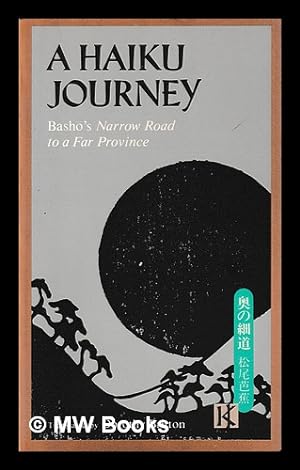In the seventeenth century, the pilgrim-poet Basho undertook on foot a difficult and perilous journey to the remote northeastern provinces of Honshu, Japan's main island. Throughout the five-month journey, the master of haiku kept a record of his impressions in a prose-poetry dairy called Oku no Hosomichi, "The Narrow Road to the Far North." That dairy was to become one of the classics of Japanese literature.
In A Reader's Guide to Japanese Literature, J. Thomas Rimer writes of this classic:
"[The wry and human touch Basho brought to his haiku] ... may well serve to disguise for the casual reader the fact that Basho was a profoundly serious artist, whose work can be read and pondered for spiritual depths, however pleasant it may be to splash around in his shallows. Nowhere can these qualities be better seen than in his long poetic diary The Narrow Road to the Deep North (Oku no hosomichi), first published in 1702, eight years after his death. It is the longest and, in received opinion, the greatest of his travel accounts, although several of the others ... contain passages in prose and poetry of the highest accomplishment. Basho wrote the diary as a literary re-creation of an actual journey he made to the then remote reaches of northern Japan, a trip begun in 1689 and lasting for over two years. In this diary, which he kept reworking and revising until his death, he mixed fact, fiction, poetry, and prose to create the record of a journey that moves both geographically and spiritually, one strand mixing with the other on virtually every page. Read and reread with care, The Narrow Road to the Deep North can reveal more qualities still basic to Japanese cultural attitudes than perhaps any other work in the whole canon of classical literature. For once, the highest of reputations is truly deserved."
The Translator: Dorothy Guyver Britton--writer, poet, and composer--is half English and half American, and was born in Japan. Educated in all three countries, she studied composition with Darius Milhaud at Mills college in California. Her suites Yedo Fantasy and Tokyo Impressions were described by the American Record Guide as a highly successful "translation of the koto-samisen aesthetic into Occidental terms." Besides music, she has published poems, essays, articles, and books in both English and Japanese, as well as numerous translations. Of her English versions of Japanese poetry an American reviewer has written: "Most translations rarely capture the succinct beauty and subtlety of haiku, but [Britton's] come close in form and content." In private life she is Lady Bouchier, widow of the late Air Vice Marshal Sir Cecil ("Boy") Bouchier, K.B.E., C.B., D.F.C., well known for his role in the Battle of Britain.
